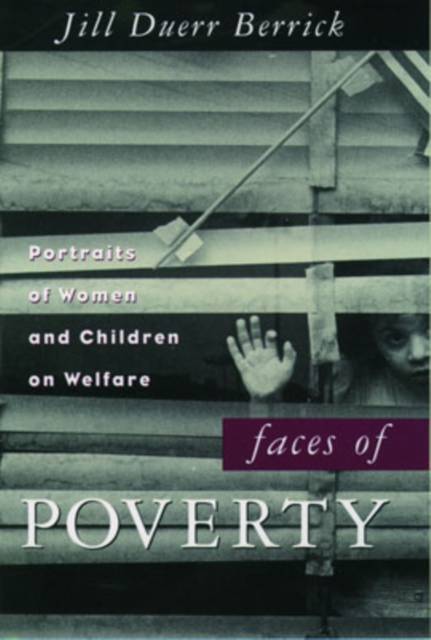
- Retrait gratuit dans votre magasin Club
- 7.000.000 titres dans notre catalogue
- Payer en toute sécurité
- Toujours un magasin près de chez vous
- Retrait gratuit dans votre magasin Club
- 7.000.000 titres dans notre catalogue
- Payer en toute sécurité
- Toujours un magasin près de chez vous
Faces of Poverty
Portraits of Women and Children on Welfare
Jill Duerr Berrick
Livre broché | Anglais
20,45 €
+ 40 points
Description
Most Americans are insulated from the poor; it's hard to imagine the challenges of poverty, the daily fears of crime and victimization, the frustration of not being able to provide for a child. Instead, we are often exposed to the rhetoric and hyperbole about the excesses of the American welfare system. These messages color our perception of the welfare problem in the United States and they close the American mind to a full understanding of the complexity of family poverty. But who are these poor families? What do we know about how they arrived in such desperate straits? Is poverty their fate for a lifetime or for only a brief period? In Faces of Poverty, Jill Duerr Berrick answers these questions as she dispels the misconceptions and myths about welfare and the welfare population that have clouded the true picture of poverty in America.
Over the course of a year, Berrick spent numerous hours as a participant-observer with five women and their families, documenting their daily activities, thoughts, and fears as they managed the strains of poverty. We meet Ana, Sandy, Rebecca, Darlene, and Cora, all of whom, at some point, have turned to welfare for support. Each represents a wider segment of the welfare population--ranging from Ana (who lost a business, injured her back, and temporarily lost her job, all in a short period of time) to Cora (who was raised in poverty, spent ten years in an abusive relationship, and now struggles to raise six children in a drug-infested neighborhood). And as Berrick documents these women's experiences, she also debunks many of the myths about welfare: she reveals that welfare is not generous (welfare families remain below the poverty line even with government assistance); that the majority of women on welfare are not long-term welfare dependents; that welfare does not run in families; that "welfare mothers" do not keep having children to increase their payments (women on welfare have, on average, two children); and that almost half of all women on welfare turned to it after a divorce.
At a time when welfare has become a hotly debated political issue, Faces of Poverty gives us the facts. The debate surrounding welfare will continue as each of the 50 states struggles to reform their welfare programs, and this debate will turn on the public's perception of the welfare population. Berrick offers insight into each of the reforms under consideration and starkly demonstrates their implications for poor women and children. She provides a window into these women's lives, brilliantly portraying their hopes and fears and their struggle to live with dignity.
Over the course of a year, Berrick spent numerous hours as a participant-observer with five women and their families, documenting their daily activities, thoughts, and fears as they managed the strains of poverty. We meet Ana, Sandy, Rebecca, Darlene, and Cora, all of whom, at some point, have turned to welfare for support. Each represents a wider segment of the welfare population--ranging from Ana (who lost a business, injured her back, and temporarily lost her job, all in a short period of time) to Cora (who was raised in poverty, spent ten years in an abusive relationship, and now struggles to raise six children in a drug-infested neighborhood). And as Berrick documents these women's experiences, she also debunks many of the myths about welfare: she reveals that welfare is not generous (welfare families remain below the poverty line even with government assistance); that the majority of women on welfare are not long-term welfare dependents; that welfare does not run in families; that "welfare mothers" do not keep having children to increase their payments (women on welfare have, on average, two children); and that almost half of all women on welfare turned to it after a divorce.
At a time when welfare has become a hotly debated political issue, Faces of Poverty gives us the facts. The debate surrounding welfare will continue as each of the 50 states struggles to reform their welfare programs, and this debate will turn on the public's perception of the welfare population. Berrick offers insight into each of the reforms under consideration and starkly demonstrates their implications for poor women and children. She provides a window into these women's lives, brilliantly portraying their hopes and fears and their struggle to live with dignity.
Spécifications
Parties prenantes
- Auteur(s) :
- Editeur:
Contenu
- Nombre de pages :
- 224
- Langue:
- Anglais
Caractéristiques
- EAN:
- 9780195113754
- Date de parution :
- 27-03-97
- Format:
- Livre broché
- Format numérique:
- Trade paperback (VS)
- Dimensions :
- 136 mm x 203 mm
- Poids :
- 185 g







